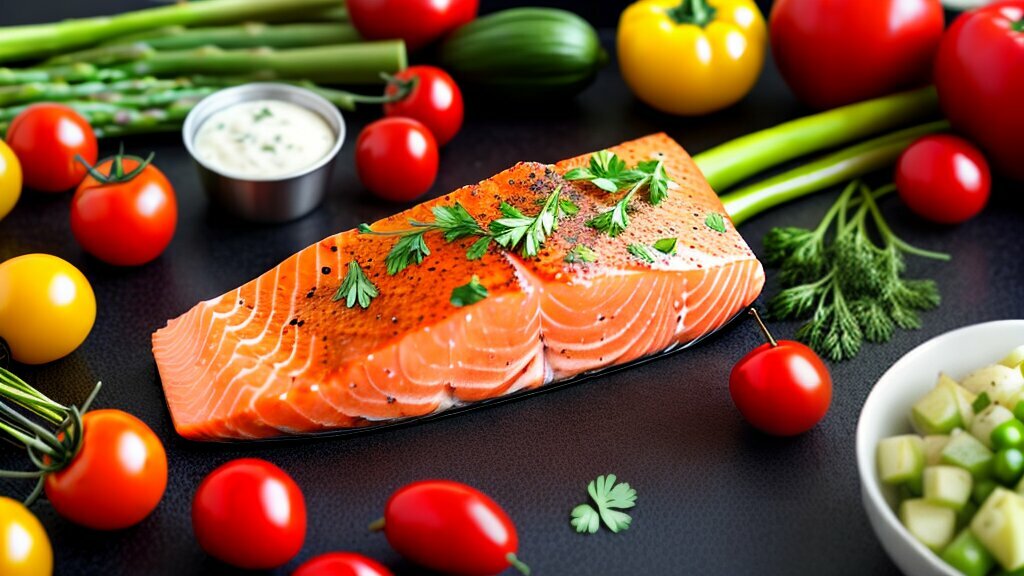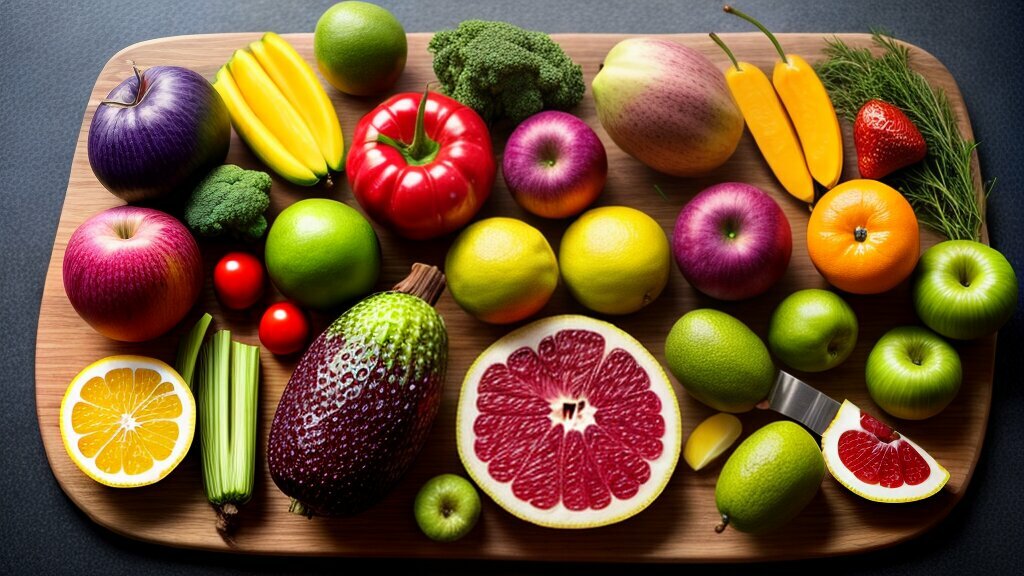Welcome to your ultimate guide to health-conscious eating in Australia. In today’s fast-paced world, making healthy food choices can be challenging. However, adopting a health-conscious eating approach can have a significant impact on your overall wellbeing. This guide will provide you with the knowledge and tools you need to make informed decisions about your diet and achieve your health goals.
Whether you’re looking to manage your weight, improve your energy levels, or simply feel better, this guide is designed for you. By choosing nutrient-rich foods and practicing mindful eating, you can nourish your body and mind, and cultivate lifelong wellness habits. Let’s get started!
Key Takeaways:
- Health-conscious eating is crucial for maintaining a healthy lifestyle
- This guide will provide you with the knowledge and tools to make informed decisions about your diet
- Nutrient-rich foods and mindful eating can help you achieve better overall wellbeing
Understanding Health-Conscious Eating
If you’re serious about leading a healthy lifestyle, adopting a health-conscious eating approach should be a top priority. Health-conscious eating involves making food choices that support your physical and mental well-being. By selecting nutrient-rich foods and eating mindfully, you’re taking a proactive approach to maintaining good health.
Health-conscious eating is about prioritizing your health and happiness through food choices.
To understand health-conscious eating, it’s important to recognize its key principles. Firstly, this approach emphasizes the consumption of whole, nutrient-rich foods, such as fruits, vegetables, whole grains, lean proteins, and healthy fats. Secondly, it focuses on portion control and balance, ensuring you’re consuming the right amount of food for your body’s needs. Finally, health-conscious eating involves mindful eating, which means paying attention to hunger and fullness cues, eating slowly, and savoring each bite.
By adopting health-conscious eating habits, you’ll experience improved overall wellness, increased energy levels, and better weight management.
The Benefits of Health-Conscious Eating
When you prioritize health-conscious eating, your body will thank you. Eating a balanced diet that’s rich in nutrients can help to reduce the risk of chronic diseases such as diabetes, heart disease, and certain types of cancer. Moreover, you’ll have more energy to tackle your daily tasks and maintain an active lifestyle.
Health-conscious eating can help you to live a longer, healthier, and happier life.
Another benefit of health-conscious eating is that it can assist with weight management. Consuming whole, nutrient-rich foods can help to keep you feeling full and satisfied for longer periods, preventing overeating and reducing the likelihood of weight gain. Additionally, mindful eating practices can help you to recognize when your body is truly hungry, as opposed to eating out of boredom or stress.
By practicing health-conscious eating, you’ll be better equipped to achieve and maintain a healthy weight.

Building a Balanced Diet
To achieve health-conscious eating, it’s important to focus on building a balanced diet. This means consuming a variety of nutrient-rich foods that provide your body with the necessary vitamins, minerals, and macronutrients.
Start by incorporating plenty of fruits and vegetables into your meals. These foods are packed with vitamins and minerals and can help reduce your risk of chronic diseases such as heart disease and cancer. Aim for at least five servings of fruits and vegetables per day.
| Food Group | Serving Size |
|---|---|
| Fruits | 1 medium piece or 1 cup (250mL) chopped fruit |
| Vegetables | 1 cup raw or 1/2 cup cooked vegetables |
In addition to fruits and vegetables, incorporate whole grains, lean proteins, and healthy fats into your meals. Examples of these foods include whole grain bread, brown rice, chicken breast, fish, nuts and seeds, and avocado.
It’s also important to practice portion control and mindful eating when building a balanced diet. Use smaller plates and listen to your body’s hunger and fullness cues to avoid overeating. Additionally, planning your meals in advance can help ensure you make nutritious choices throughout the day.

Remember, building a balanced diet doesn’t mean you have to eliminate all of your favorite foods. Rather, it’s about making sure you’re consuming a variety of nutrient-dense foods to support your overall health and wellbeing.
Mindful Eating for Better Health
Mindful eating is a crucial component of health-conscious eating. It involves paying attention to your body’s hunger and fullness cues, as well as savoring each bite and being present in the moment while eating. By practicing mindful eating, you can improve your relationship with food, enhance your enjoyment of meals, and prevent overeating.
To start practicing mindful eating, try the following strategies:
- Eat slowly and savor each bite
- Minimize distractions while eating, such as watching TV or using your phone
- Chew your food thoroughly
- Pay attention to your body’s hunger and fullness cues
- Avoid eating when you’re overly emotional or stressed
By incorporating mindful eating into your health-conscious eating approach, you can achieve better overall wellness and long-term success in maintaining healthy eating habits.

Navigating Nutrition Tips
When it comes to health-conscious eating, it’s important to focus not only on what you eat but also on the quality of the food. To help you make informed choices, here are some practical nutrition tips:
- Read food labels: Pay attention to the ingredients and nutritional information on packaged foods. Look for products with no or minimal added sugars, sodium, and saturated fats.
- Reduce processed foods: Limit your intake of processed snacks, baked goods, and sugary drinks. Opt for whole foods that are minimally processed instead.
- Stay hydrated: Drinking plenty of water is essential for good health. Aim for at least eight glasses a day and avoid sugary beverages.
- Incorporate superfoods: Foods like blueberries, kale, salmon, and almonds are packed with nutrients and antioxidants that promote good health. Try to include them in your diet regularly.
If you’re unsure about what to eat or have specific dietary needs, consider speaking with a registered dietitian who can provide personalized advice and recommendations.

“Let food be thy medicine and medicine be thy food.” – Hippocrates
Healthy Recipes for Every Meal
Eating healthily doesn’t have to be boring! In fact, there are plenty of delicious and nutritious meals you can enjoy that will also help you stay on track with your health-conscious eating goals. Check out these healthy recipes for breakfast, lunch, dinner, and snacks.
Breakfast
Start your day off right with a nutrient-packed breakfast. Try this recipe for a tasty and filling breakfast bowl:
| Ingredients: | 2 cups cooked quinoa | 1/2 cup unsweetened almond milk | 1 banana, sliced |
|---|---|---|---|
| 1/4 cup chopped walnuts | 1 tbsp honey | 1 tsp cinnamon |
In a bowl, combine cooked quinoa and almond milk. Top with banana, walnuts, honey, and cinnamon. Serve warm.

Lunch
For a delicious and satisfying lunch, try this simple recipe for a turkey and avocado wrap:
| Ingredients: | 1 whole-wheat wrap | 2 oz sliced turkey breast | 1/2 avocado, sliced |
|---|---|---|---|
| 1/4 cup sliced cucumber | 1/4 cup sliced tomato | 1 tsp Dijon mustard |
Lay the whole-wheat wrap flat and spread the mustard over it. Layer the turkey, avocado, cucumber, and tomato on top. Roll the wrap and enjoy!

Dinner
This easy and flavorful recipe for roasted salmon and vegetables is perfect for a healthy dinner:
| Ingredients: | 4 salmon fillets | 2 cups chopped broccoli | 1 red bell pepper, sliced |
|---|---|---|---|
| 1 yellow onion, sliced | 3 tbsp olive oil | 1 tsp garlic powder |
Preheat the oven to 400°F. Toss the broccoli, red bell pepper, and yellow onion with olive oil and garlic powder. Place the salmon fillets on top of the vegetables. Roast for 15-20 minutes, until the salmon is cooked through. Serve hot.

Snacks
For a healthy and satisfying snack, try this recipe for homemade trail mix:
| Ingredients: | 1 cup almonds | 1 cup cashews | 1 cup dried cranberries |
|---|---|---|---|
| 1 cup dark chocolate chips | 1/2 cup unsweetened coconut flakes | 1 tsp sea salt |
Mix all ingredients in a bowl and store in an airtight container for a quick and healthy snack on the go.

Cultivating Wellness Habits
Health-conscious eating is only one aspect of a healthy lifestyle. To enhance your overall wellbeing, it’s essential to cultivate wellness habits in various areas of your life, including physical activity, stress management, and sleep. By prioritizing these habits, you can maximize the benefits of health-conscious eating.
Regular Physical Activity
Physical activity is essential for maintaining good health and wellbeing, and it’s an integral part of a healthy lifestyle. It can help you maintain a healthy weight, improve your cardiovascular health, and boost your mood and energy levels. Aim for at least 150 minutes of moderate-intensity activity or 75 minutes of vigorous-intensity activity per week. This can easily be achieved through activities such as brisk walking, cycling, jogging, or swimming.
Stress Management
Stress can have a significant impact on your health, both physically and mentally. Therefore, it’s crucial to develop effective strategies to manage stress. Some effective stress management techniques include meditation, deep breathing exercises, yoga, and mindfulness practices. Regularly engage in activities that help you relax and unwind, such as reading, listening to music, or taking a bath.
Adequate Sleep
Getting enough sleep is essential for optimal health and wellbeing. It helps your body repair and rejuvenate, improves cognitive function, and regulates your hormones. Aim for at least seven to eight hours of sleep per night, and establish a consistent sleep schedule to help regulate your body’s natural sleep-wake cycle. Avoid screen time before bed, and create a relaxing bedtime routine to help you wind down and prepare for sleep.
Remember, health-conscious eating is just one piece of the puzzle when it comes to living a healthy lifestyle. By prioritizing physical activity, stress management, and sleep, you can enhance the benefits of health-conscious eating and achieve optimal health and wellbeing.

Conclusion
Congratulations! You have now completed your ultimate guide to mastering health-conscious eating in Australia. By understanding the principles of health-conscious eating, building a balanced diet, practicing mindful eating, navigating nutrition tips, trying healthy recipes, and cultivating wellness habits, you have taken a significant step towards achieving a healthier lifestyle.
Remember, health-conscious eating is all about making positive changes that suit your preferences and lifestyle, rather than following strict rules or diets. By incorporating nutrient-rich foods into your diet, practicing portion control, and being mindful of your eating habits, you can improve your overall wellness, increase your energy levels, and manage your weight more effectively.
Don’t forget to consult with a healthcare professional or a registered dietitian if you have any concerns about your eating habits or if you need personalized advice.
Now that you have all the knowledge and skills needed, it’s time to take action and make health-conscious eating a part of your daily life. Start small and build on your successes over time. With patience, commitment, and the right mindset, you can achieve your health goals and live a happier, healthier life in Australia.
FAQ
Q: What is health-conscious eating?
A: Health-conscious eating refers to a mindful approach towards food choices and consumption, focusing on nutrient-rich foods and balancing one’s diet for optimal wellness.
Q: Why is health-conscious eating important?
A: Health-conscious eating is important because it promotes overall wellness, increases energy levels, and helps with weight management. By nourishing your body with nutrient-rich foods, you can support your physical and mental health.
Q: How can I build a balanced diet?
A: Building a balanced diet involves incorporating a variety of fruits, vegetables, whole grains, lean proteins, and healthy fats into your meals. It’s also important to practice portion control and plan your meals ahead of time.
Q: What is mindful eating?
A: Mindful eating is the practice of being fully present and aware while eating. It involves paying attention to hunger and fullness cues, eating slowly, and savoring each bite. Mindful eating helps foster a healthy relationship with food and promotes better digestion.
Q: What are some nutrition tips for health-conscious eating?
A: Nutrition tips for health-conscious eating include reading food labels, reducing processed foods, staying hydrated, and incorporating superfoods into your diet. It’s also important to consult with a healthcare professional or nutritionist for personalized advice.
Q: Can you provide some healthy recipes for health-conscious eating?
A: Yes, we have a collection of healthy recipes suitable for breakfast, lunch, dinner, and snacks. These recipes cater to various dietary preferences such as vegetarian, gluten-free, and dairy-free options. Cooking at home and meal prepping are encouraged for better control over ingredients.
Q: What other habits contribute to health-conscious eating?
A: In addition to mindful eating and balanced nutrition, regular physical activity, stress management, and adequate sleep are crucial for cultivating wellness habits. Taking a holistic approach to your wellbeing will enhance the benefits of health-conscious eating.
